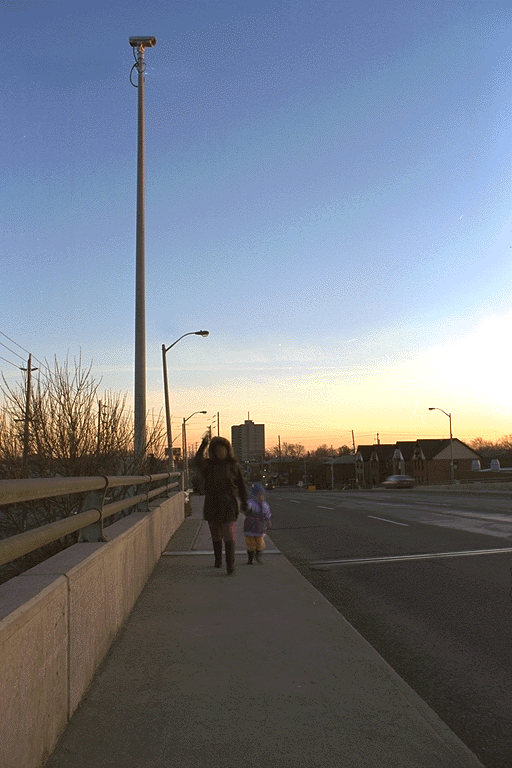Government watchtowers looming over Canadian suburbs

Next watchtower is only a few hundred feet away.
Whether you're shoveling snow off your sidewalk, or sunbathing by your
backyard pool, the Canadian government has the potential
to watching from on high.
Other governments also like the ubiquitous surveillance afforded by
roadside surveillance cameras.
A recent New York Times article shows that
Big Brother is popular among the British
police. It is kind of ironic that these police,
who want to know what everyone is up to, spoke to the New York
Times on condition of anonymity.
The New York Times article presents the cameras in a positive light,
failing to report on the negative feelings of many Liverpool residents.
(As a point of comparison, kudos to the
Boston Globe for presenting a recent article
Video-aided arrest raises privacy questions
stressing the importance of privacy considerations, even though the article
was with respect to a murder that was recently solved on account of
video surveillance, which is the kind of ammunition that proponents
of surveillance call upon.)
The Chinese government
routinely recorded the output of ``traffic cameras'' and
used these recordings to later round up and jail
people who participated in peaceful marches.
Peaceful demonstrators in Poland were also rounded up using images from
cameras at road intersections.
Using wide disemenation of personal information to enhance privacy
What can be done about these cameras. While traditional
privacy advocates might argue that the data should be secure
(e.g. that they are okay if the data is kept secure), my
point of view is that the data should be made public.
By making the image data freely available to all, the cameras
benefit all. For example, while driving down the road, I might
check to see the traffic conditions one mile ahead, five miles ahead,
ten miles ahead, etc -- displaying roadvideo on my car's display
console.
Furthermore, by making the data public, we will not become complacent
-- we will retain the hightened sense of awareness of exactly what
information is being collected about us.
At first, this idea might seem strange, but after thinking about it
more,
it might become apparent why privacy advocates
sometimes do more to harm the cause of privacy than to help it!
There are two kinds of overtness: acquisitional overtness (how obvious the
camera is) and disemenational overtness (how obvious the video signal
from the camera is).
Look at the
relationship between acquisitional
overtness and disemenational overtness.
Privacy issues of wearable cameras
versus surveillance cameras .
.

 .
.